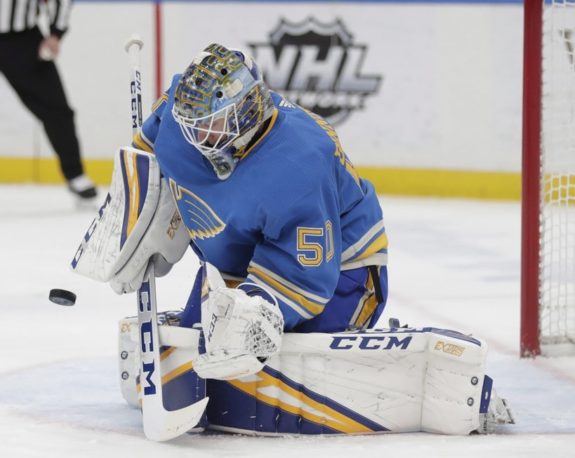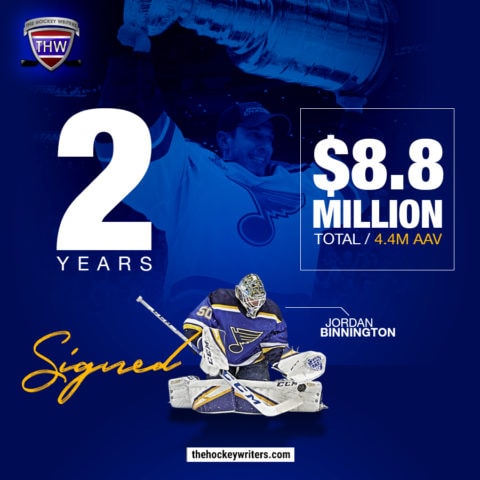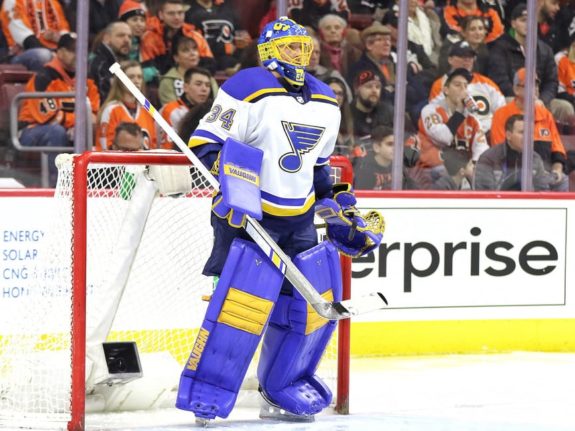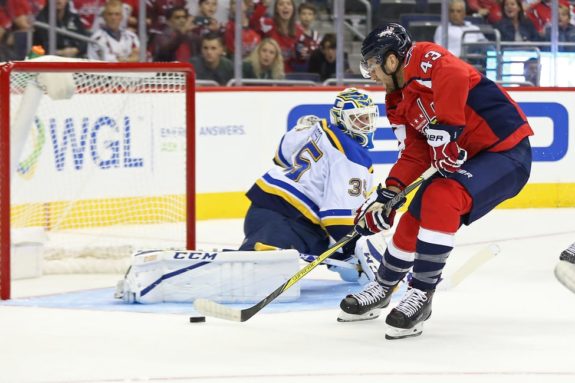When the St. Louis Blues entered the offseason, there was no question that signing goaltender Jordan Binnington to a contract extension was their most important priority. But it was also going to be a difficult negotiation. Binnington’s rise from obscurity to Stanley Cup glory was so fast and so unique that it would be difficult to find the right contract.
Saturday, the team announced that it had agreed to terms with its net minder on a two-year, $8.8 million contract, with an average annual value (AAV) of $4.4 million. While neither side likely got everything it wanted, this new contract is a perfect compromise.
Binnington’s Meteoric Rise
Before the 2018-19 season, Binnington was largely an afterthought in the Blues’ organization. He was a fourth string goalie behind Jake Allen, NHL backup Chad Johnson, and top goaltending prospect and AHL starter Ville Husso. He had been in the organization since the Blues drafted him in 2011, late in the third round. Few thought he had a future in the NHL.

But Binnington, who had put up good numbers most of his career, had different plans. He had been shipped off to the Providence Bruins during the 2017-18 season, because the Blues were without an AHL partner. Because of the distance, few noticed how good his numbers were. There, he posted a .928 save percentage (SV%) and a 2.06 goals against average (GAA) in 28 games, forcing the team to give him starts, even though he wasn’t part of their organization.
When he began the following season with similar numbers, he forced the Blues to reevaluate their goaltending standings. After Husso went down with an injury and the Blues waived Johnson, it opened up a spot for Binnington on the NHL roster. He debuted as a starter with a shutout on Jan. 07 and the rest, as they say, was history.
Binnington went 24-5-1 in 30 starts. He had a .927 SV% and a 1.89 GAA, along with five shutouts. That performance earned him a spot as a finalist for the Calder Trophy. Then, he became the first rookie in NHL history to win all 16 games in the playoffs. He posted a .914 SV% and a 2.46 GAA, leading the Blues to the first Stanley Cup in franchise history.
Stanley Cup Contract
Binnington’s incredible rise put the Blues in a difficult situation. On the one hand, they seemingly had a newfound star in net. On the other hand, he was due a contract extension, and after a season like that, there were absolutely no comparable contracts to judge on.
The Blues were already paying Allen $4.35 million per season for two more campaigns. They needed to find the right contract for Binnington, the new presumptive starter, that would both reward him for the season he had put together, and protect the franchise in the unlikely event that he proved to be a one-hit wonder.

With the arbitration date fast approaching, the Blues and Binnington agreed to a two-year contract with an AAV of $4.4 million. It checked all the boxes for the team. The short term of the deal is insurance for the microscopic sample size of Binnington’s young career, but the cap hit cannot be construed as an insult by the goaltender or his camp.
Binnington is now the 21st highest paid goalie in the NHL, displacing his backup from that spot. His new deal falls directly behind the controversial contract the Edmonton Oilers gave Mikko Koskinen earlier in the season. It is a sizable reward for just one season of NHL work, even as terrific as that season was.
Potential Problems for the Blues?
Few contracts are perfect, and this one is no exception. While the deal is a nice balance for both sides, the Blues are at risk of Binnington driving his price dramatically higher with two more strong campaigns. If that happens, they could be in serious trouble, considering that both of their current goalies’ contracts will expire in two years.

Jordan Binnington (AP Photo/Tom Gannam) 
Jake Allen (Amy Irvin / The Hockey Writers) 
Ville Husso (Geoff Burke-USA TODAY Sports)
Fortunately, that is 2021’s problem. For now, the Blues have their goaltending house in order. By that time, Husso could rise from prospect to legitimate NHL goalie, and could serve as a backup to a more expensive starter. Whatever the case, that decision is two years down the road, and as Binnington proved this season, a lot can change in that much time.